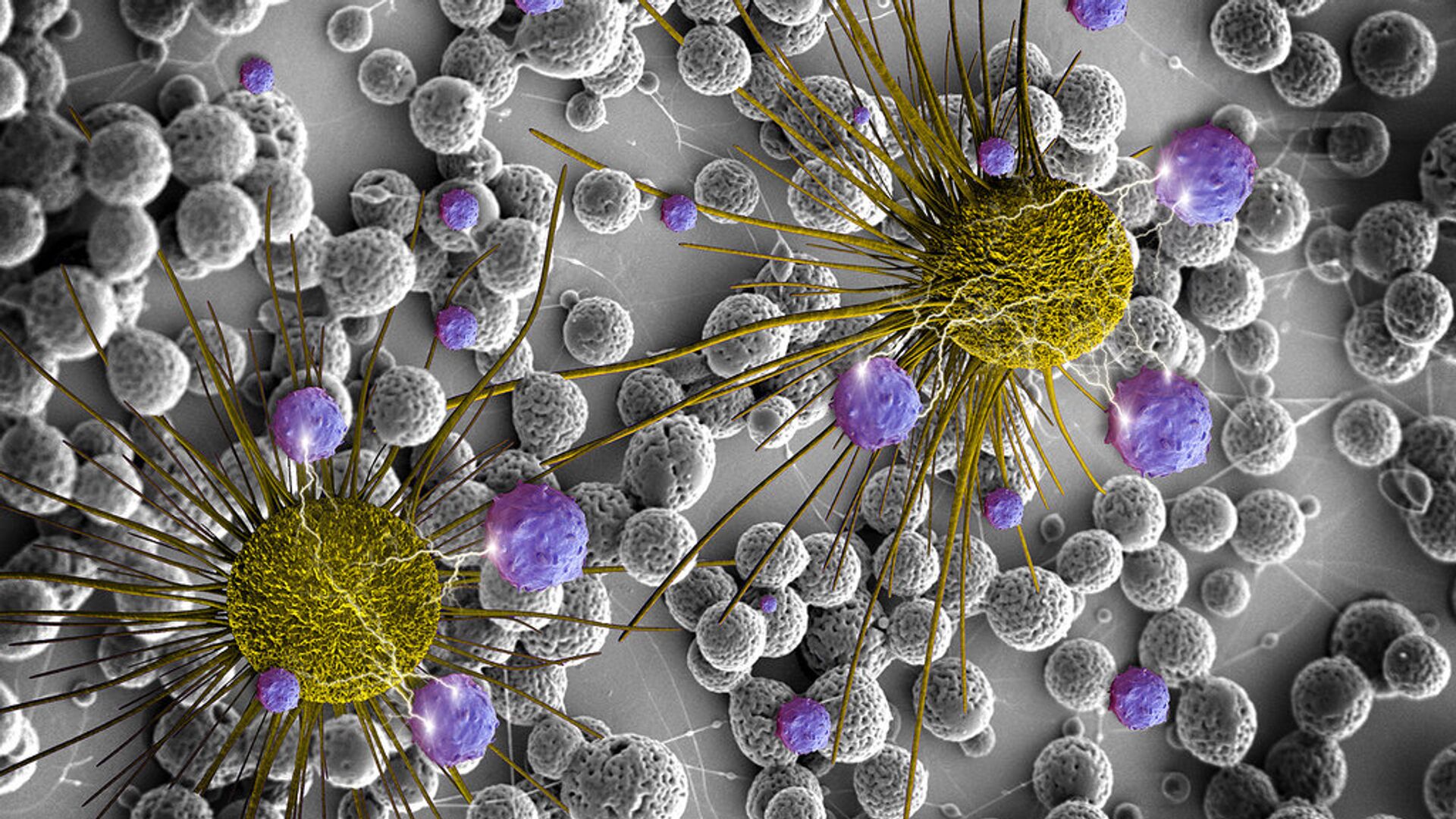https://sputnikglobe.com/20220217/anti-cancer-material-extracted-from-tropical-plant-created-in-russia-1093102353.html
Anti-Cancer Material Extracted From Tropical Plant Created in Russia
Anti-Cancer Material Extracted From Tropical Plant Created in Russia
Sputnik International
Scientists from the National University of Science and Technology "MISiS" (NUST MISIS), as part of an international group of researchers, have synthesised a... 17.02.2022, Sputnik International
2022-02-17T07:10+0000
2022-02-17T07:10+0000
2022-08-06T13:32+0000
russian national university of science and technology (misis)
plants
cancer treatment
science & tech
https://cdn1.img.sputnikglobe.com/img/103768/76/1037687604_0:115:1025:691_1920x0_80_0_0_1beac50bfa8de8981ebad7f99eb8d56b.jpg
According to the authors of the research, the new material holds great promise for use in biomedicine. The results were published in the International Journal of Materials Chemistry and Physics.Researchers from NUST MISIS have developed a technology to produce zinc oxide (ZN) nanorods (NRs). This material has unique properties: it is non-toxic, and has high photocatalytic and antioxidant activity.Scientists tested the activity of the material against various pathogenic bacteria, such as the Gram-positive bacteria Staphylococcus aureus. They also studied the anti-cancer activity of the synthesised nanorods using colourimetric tests to determine the cells' metabolic activity.To develop the new material, the authors used phytochemicals derived from the leaf extract of Manilkara littoralis, a plant in the Sapotaceae family found in tropical forests. Manilkara littoralis is a large evergreen or deciduous tree with milky sap, sometimes a shrub, totalling about 70 species.To prepare the extract, scientists harvested the young leaves of M. littoralis from rainforests on the Andaman and Nicobar Islands in India. The leaves were then washed, dried, crushed, and the extract was prepared at 80°C.According to him, in the future researchers at NUST MISIS are planning to develop a "green" method of synthesising nanomaterials for biomedical applications and expand the list of the resulting materials in terms of composition, structure, and morphology under the Priority 2030 programme.New synthesis technologies will significantly expand the usability of the synthesised materials while ensuring that they are safe for both humans and the environment.
Sputnik International
feedback@sputniknews.com
+74956456601
MIA „Rossiya Segodnya“
2022
Sputnik International
feedback@sputniknews.com
+74956456601
MIA „Rossiya Segodnya“
News
en_EN
Sputnik International
feedback@sputniknews.com
+74956456601
MIA „Rossiya Segodnya“
Sputnik International
feedback@sputniknews.com
+74956456601
MIA „Rossiya Segodnya“
russian national university of science and technology (misis), plants, cancer treatment, science & tech
russian national university of science and technology (misis), plants, cancer treatment, science & tech
Anti-Cancer Material Extracted From Tropical Plant Created in Russia
07:10 GMT 17.02.2022 (Updated: 13:32 GMT 06.08.2022) Scientists from the National University of Science and Technology "MISiS" (NUST MISIS), as part of an international group of researchers, have synthesised a new material with unique antibacterial and anti-cancer properties.
According to the authors of the research, the new material holds great promise for use in biomedicine. The results were published in the
International Journal of Materials Chemistry and Physics.
Researchers from NUST MISIS have developed a technology to produce zinc oxide (ZN) nanorods (NRs). This material has unique properties: it is non-toxic, and has high photocatalytic and antioxidant activity.
Scientists tested the activity of the material against various pathogenic bacteria, such as the Gram-positive bacteria Staphylococcus aureus. They also studied the
anti-cancer activity of the synthesised nanorods using colourimetric tests to determine the cells' metabolic activity.
To develop the new material, the authors used phytochemicals derived from the leaf extract of Manilkara littoralis, a plant in the Sapotaceae family found in tropical forests. Manilkara littoralis is a large evergreen or deciduous tree with milky sap, sometimes a shrub, totalling about 70 species.
"Most of the methods used to synthesise such nanomaterials are expensive or involve the use of toxic materials, which negatively affect humans and the environment. We have applied 'green' synthesis using inexpensive and environmentally friendly materials", said Evgeny Kolesnikov, an engineer at NUST MISIS' Department of Functional Nanosystems and High-Temperature Materials.
To prepare the extract, scientists harvested the young leaves of M. littoralis from rainforests on the Andaman and Nicobar Islands in India. The leaves were then washed, dried, crushed, and the extract was prepared at 80°C.
"We used this extract as a stabiliser in the synthesis of zinc oxide nanorods, where it acted as an oxidising/reducing agent in the decomposition of acetate. As a result, we were able to develop an alternative way of producing anti-cancer and antibacterial drugs", said Evgeny Kolesnikov.
According to him, in the future researchers at NUST MISIS are planning to develop a "green" method of synthesising nanomaterials for biomedical applications and expand the list of the resulting materials in terms of composition, structure, and morphology under the Priority 2030 programme.
New synthesis technologies will significantly expand the usability of the synthesised materials while ensuring that they are safe for both humans and the environment.

